ESCAPE
Malawi’s Majete is one of the finest wildlife parks in Africa for game viewing
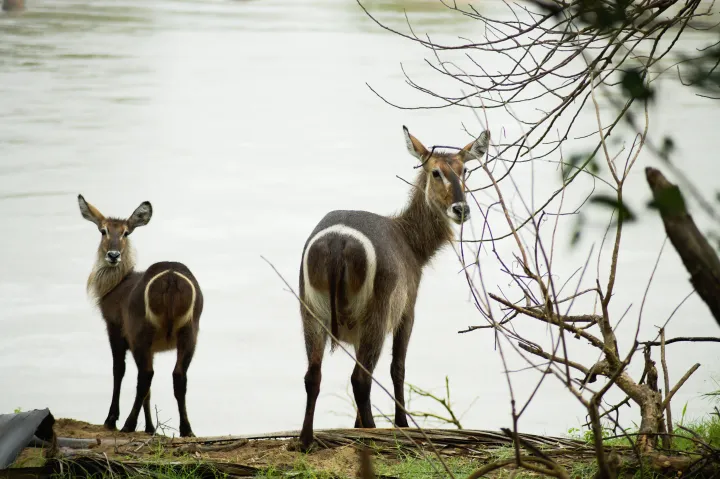
Majete Wildlife Reserve in Malawi is a Big Five conservation area intent on protecting its black rhinos. Each day, armed trackers locate them across the 700km2 area to ensure their safety. Daily Maverick joins them on an early-morning patrol.
She was a black rhino with a temper, the bush restricted visibility and there were lions about. Majete’s head of law enforcement, Billiat Zidana, was unfazed. “Come,” he commanded, and like a sheep I followed into lion country, sticking as close to his .458 rifle as possible.
“If a lion charges you, stand still,” he said. “But if a rhino charges, climb a tree very quickly. We monitors are very good at climbing trees; we go up in seconds, like monkeys. And you have to watch for buffaloes. Sometimes they’re lying down in the long grass and they can be more angry than rhinos.”
That was even more alarming – woodland trees round there were either vertical shafts of knobthorn and white acacias or bushes that a tonne of pissed-off rhino would blast right through.
Further instructions were offered: “Watch your step and don’t stand on deadwood. Whenever you approach a rhino move slowly and examine all angles. Don’t just concentrate on the track. Raise your head and watch what’s going on around you.”
Following the trackers reading rhino signs completely invisible to me in the wild lavender and swordgrass, I was studying more trees for climbability than I had in my whole life, but was also aware that the long grass could suddenly produce a buffalo. I would have to rely on adrenalin to provide an unimaginable feat of gymnastics.
Suddenly, a light brown body flashed across a break in the underbrush ahead. “Impala?” I ventured. “No, a lion,” Zidana said.
A few hours deep into the trek, the monitors identified our quarry as Shamwari, a very bad-tempered black rhino with a calf.
“A calf makes them very fierce,” Zidana commented, helpfully.
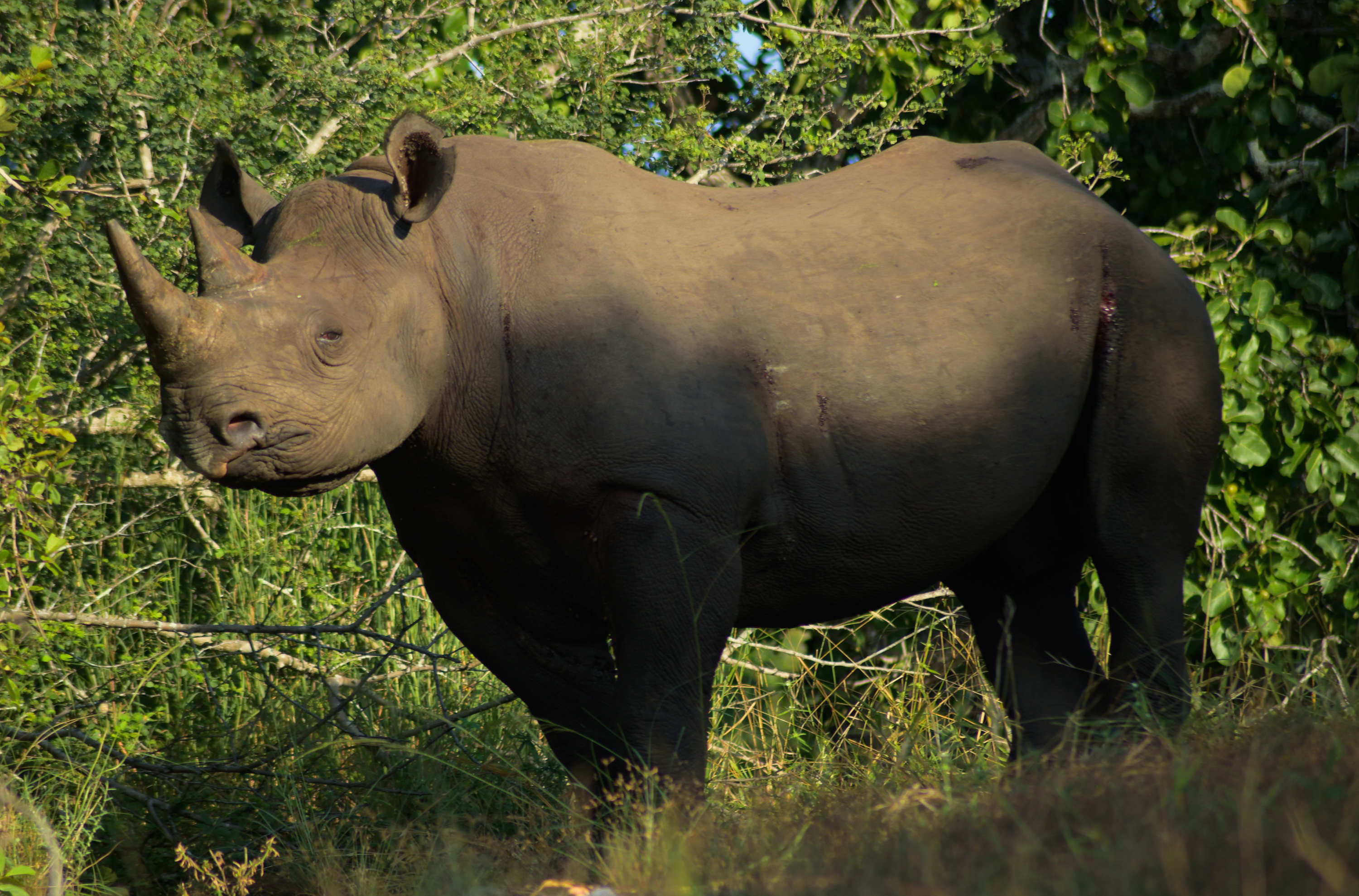
Black rhino at Majete Wildlife Reserve. (Photo: Thoko Chikondi)
Shamwari smelled us before we saw her. There was a huge, angry huff and she charged … then stopped. Clearly satisfied with her performance, she returned to her calf and took off down a stream bed.
On the way back to the vehicle we avoided a herd of elephants that were so close in the thick woodland we could hear their rumbling communication but not see them. We stopped to watch three giraffes.
“How often do you do this monitoring?” I asked Zidana (by then we’d been walking for more than four hours).
“We have patrols following rhinos every day,” he replied. “Animals on Majete are not habituated, they’re truly wild. It’s important to be calm and know what you’re doing. Patrolling is necessary. We haven’t lost a black rhino in 20 years.”
While it was normal for the monitors, walking among wild animals on a daily basis seemed crazy and I told Zidana this.
“You live where there are no wild animals,” he replied. “For me, that’s crazy. It would make me feel so lonely.”

Lions on a night kill in Majete. (Photo: Don Pinnock)
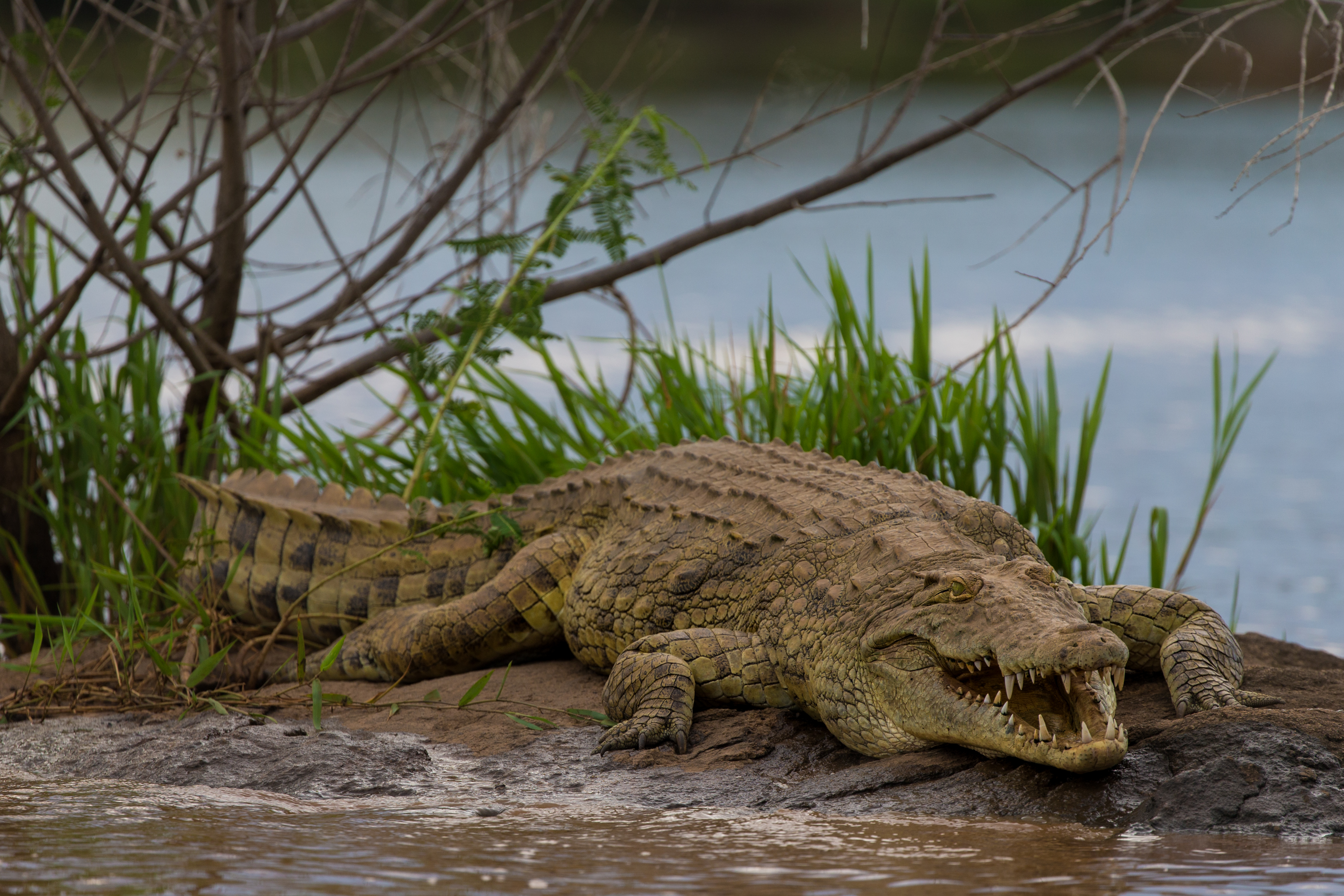
Majete borders the Shire River that connects Lake Malawi with the Zambezi River and there’s no shortage of giant crocs. (Photo: Marcus Westberg)
Back at Thawale Tented Lodge a fine brunch was waiting. Young baboons were playing catch-me near a watering hole just off the stoep where two elephants were slurping up water and flapping their massive ears to cool their blood. One backed two steps, crossed his front legs, draped his trunk languidly over one tusk and gazed at us benignly.
I know all wild animals are dangerous, but on matters of territory, I’d rather reason it out with an elephant than a black rhino. They just seem so much wiser.
Adviser
Majete Wildlife Reserve in southwestern Malawi was established as a protected area in 1955. Its animal populations were decimated during the late 1970s and 1980s but in 2003 the conservation organisation African Parks took over its management in a public-private partnership with the Malawi Department of National Parks and Wildlife.
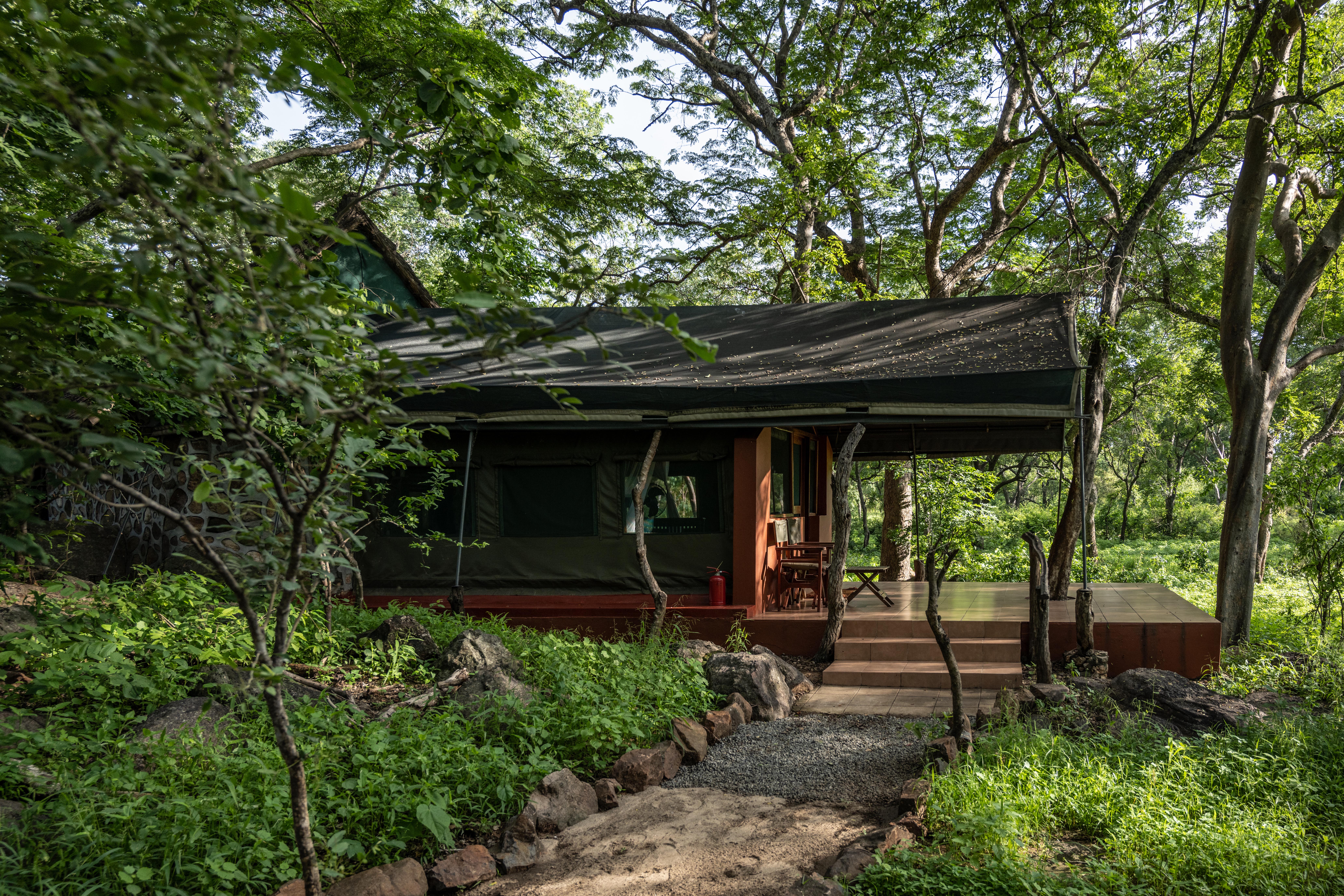
Thawale Lodge in the Majete Wildlife Reserve has luxury tents and a fine restaurant. (Photo: Gael Vande Weghe)
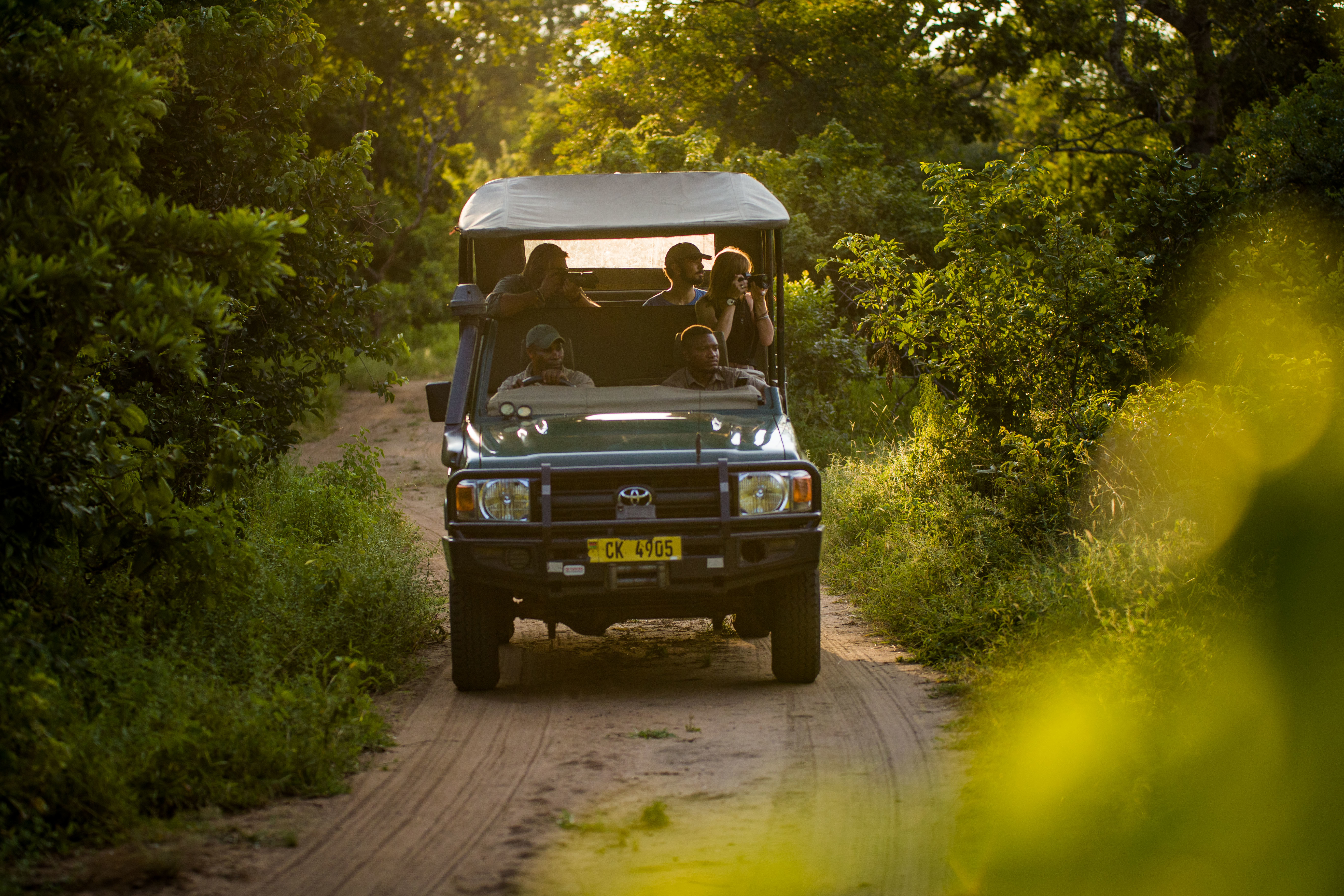
Exploring the magic of Majete. (Photo: Naude Heunis)
Since then, wildlife has been restored, the park has achieved Big Five game status and is one of the finest parks in Africa for game viewing. It has excellent community outreach programmes and all poaching has ceased. It’s a model for nature conservation.
Thawale Tented Camp has eight tented chalets and two family chalets. There is a lounge and dining area beside a busy waterhole. There’s also a swimming pool. Guided game drives are offered or you can self-drive but need a 4×4 to access some areas of the reserve. In the wet season, animal sightings and excellent birding are assured.
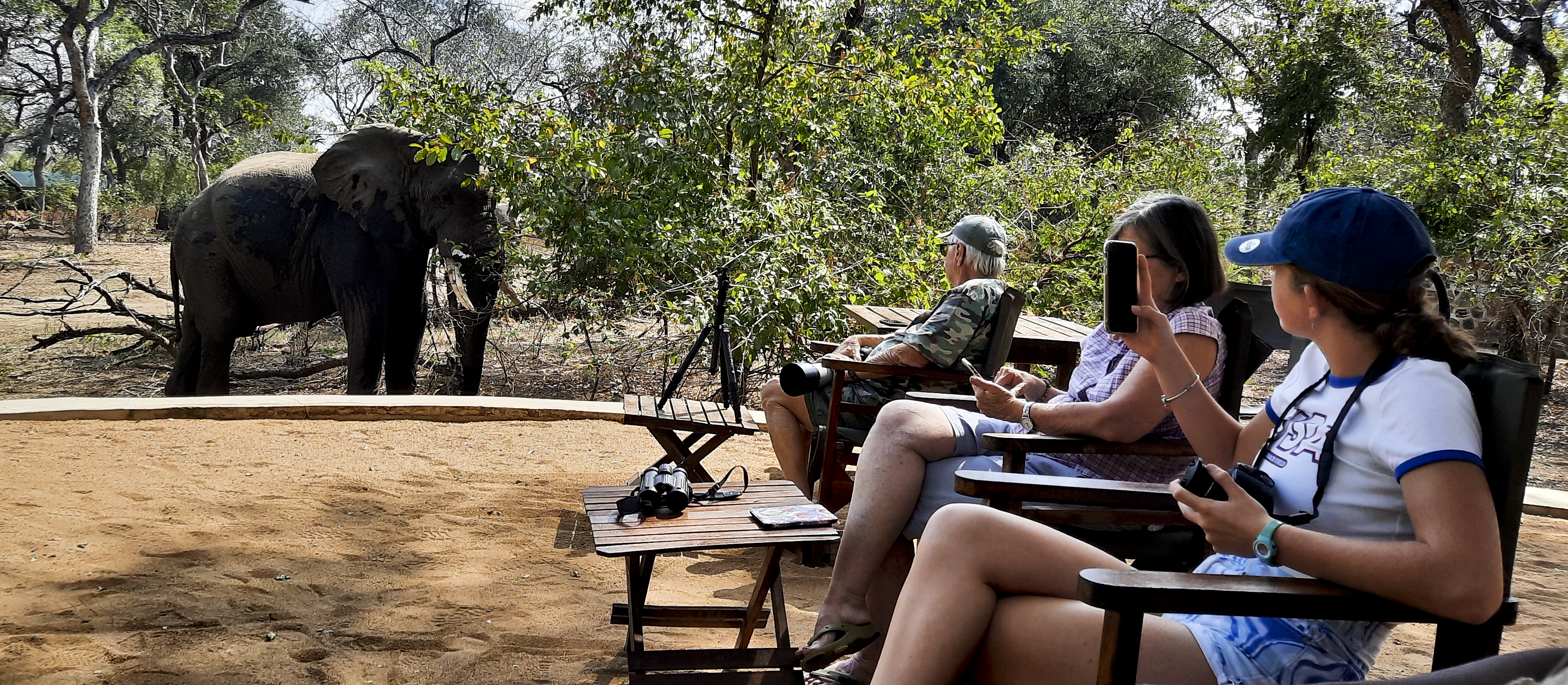
At Thawale Game Lodge in Majete, elephants join you for sundowners. (Photo: Don Pinnock)
There is also a campsite that can accommodate up to 25 guests. The site is open, allowing wildlife to move freely through camp, but does have a fence around it to stop elephants from surrounding your tent. There is also an elevated overnight hide at a waterhole.
At Majete, guests get the feeling of being invited into a working conservation project rather than conservation being an add-on to a primarily tourist initiative. DM
For more information about Majete Wildlife Reserve as well as costs, click here.



















Thanks Don – arm-chair travel at its best. That is exactly what ellies do – ‘SLURP’. The Malmesbury-Darling CK 4905 landcruiser registration plate baffled me though – its a long game drive ….. sounds of laughter.
Thanks, Don, for the interesting and knowlegeble account of your experience of walking in wild places.
I have spent all my life trying to get away to go to wild places. I am now retired; and am an honorary SANParks Ranger in South africa.
It makes my heart so glad to hear of successful conservation projects such as Majete Wildlife Reserve in Malawi. I must go and visit that place. This is another tool to persuade everyone that wildlife is wonderful and precious and must be conserved for all people and for future generations.
I know what you mean, when you say encountering Black Rhinos in the wild, can cause some anxiety.
I was once in the position, years ago, walking through thick Acacia bush in Mfolozi Game Reserve when we heard a distinctive snort and our Guard whispered ‘iBejane (Black Rhino)’. As is customary, our team each found a thorn tree to climb. Mine was a little tree, better than nothing. But hardly got me 2 metres off the ground. Then all hell was let loose the Rhino exploded through an acacia bush up front and then stood snorting in our little clearing. I was beyond scared and the adrenalin was pumping.
After making its presence known (it seemed like it looked at me with it’s tiny little eyes – probably not even seeing what it had detected by scent and sound – gave, what sounded like, a disappointed last snort and crashed away in another direction. Our relief was immense…
That was my first encounter with the magnificent, charging, Black Rhino.
Whew.
Reasons not to talk when walking in the bush … 🙂 🙂 🙂
Wonderful article, thank you. Majete really is a gem as is Liwonde 3 hours north, and Lengwe which is just down the road from Majete. African Parks are to be commended for turning around these reserves so successfully and also getting the buy in not only of the surrounding communities but the political establishment as well. The CK numberplate is for Chikwawa, the town next to Majete and it isn’t in the Cape 🙂
Great article -thanks Don. A group of us were walking through Umfolozi many years ago when a Black Rhino came charging through the Acacias announcing his presence and intent by the sound of crashing trees. We all scattered. I found a fairly substantial tree and stood behind it moving to keep the Rhino in view. Our Game Guard gave this manoeuvre a thumbs up and said it was his preferred course of action. When we gathered our group together, Dick, who had been full of male bravado was nowhere to be seen. We found him a few minutes later up an Acacia,white as a sheet and somewhat scratched!
Chastened as well…